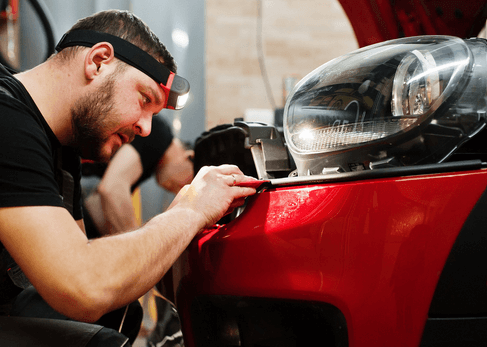Which Car Services Are Covered By Insurance?
Auto Shops Located in: Chapel Hill, Durham, Taleigh, Apex, and Cary North Carolina

The service covered by your car insurance company will largely depend on the type of coverage you’ve chosen. Policies have different parts that cover different expenses. You may have one section of the policy reserved for repairing your vehicle after an accident. Another section of the policy is set aside for other vehicle repairs. If you want to save money on repairs and take advantage of other auto services, it’s important to know what common car services are usually covered by insurance companies.
4 Car Services Usually Covered by Insurance
If you want to get the most out of your car insurance policy, you’ll need to know what’s typically covered by major car insurance companies. Whether it’s car accident repair coverage when an accident occurs without another involved driver or rental car reimbursement, you can often save money by taking advantage of your policy’s coverages. While you’ll want to check your policy for specific policy details, the following four car services are typically covered by insurance:
1. Rental Car Reimbursement
Most policies include rental car reimbursement. This reimbursement keeps you on the road when your vehicle can’t. After an accident occurs, you’ll likely have to take your car to the shop and leave it there for a few days or even weeks.
Since you’ll still need to get to work and run errands after an accident, taking advantage of rental reimbursement can ensure you have a means of transportation while your car is in the shop. If rental car reimbursement isn’t automatically included, auto insurance companies often offer it for an extra fee.
2. Roadside Assistance
Roadside assistance covers several problems that will arise during your lifetime as an automobile driver. For example, you can run over a nail or hit a serious pothole that causes a flat tire. Or maybe you’re at a friend’s house and realize you accidentally locked your keys in the car. Perhaps you forgot to stop and fuel up, and before you know it, you’re drifting onto the shoulder.
For those in muddy or snowy areas, you’ll need help getting back on the road if you find yourself stuck. Alongside these potentially dangerous or inconvenient situations, something else could go wrong, like the engine or transmission giving out, leaving you in need of a tow. Each one of these issues is covered under roadside assistance. There’s usually an additional fee for this service, but it’s worth every penny.
3. Damage Due to Natural Disasters
There are a number of scenarios in which your car can be damaged. When Mother Nature unleashes her power, your vehicle may be the victim of damage beyond your control. Heavy tree branches may embed themselves in your car’s roof, or strong winds may sweep your vehicle to the other side of town.
Typically, a comprehensive insurance plan will cover repairs due to natural disasters, such as floods, hurricanes, tornadoes, and other similar weather events. This coverage is an essential part of any car insurance policy, as natural disasters can significantly damage your vehicle and cause you to need to receive costly repairs.
4. Accidents With No Other Driver
Collision insurance not only covers accidents with other drivers but also accidents where there’s no other driver involved. You may swerve to avoid a deer and crush your front end against a light pole, or a pedestrian may suddenly jump in front of your car, causing you to run up on the curb and hit a fence.
Hitting an empty parked car is another accident typically covered by collision policies. To receive car accident repair coverage, you’ll have to submit a claim for damage to the insurance company before they pay to repair the damage.
What Isn’t Covered by Car Repair Insurance?
It’s good to know what your insurance company will cover, but it’s equally important to understand what claims will be denied. For example, general maintenance like oil changes and tire rotations won’t be covered. On that same list are personal items that end up damaged after an accident, normal electrical wear and tear, damage committed by the previous owner, and any damage that’s deemed intentional.
It’s also important to understand your policy’s limitations. If the damage caused is your fault, but the repairs to the property exceed your coverage limits, there won’t be an insurance payout.
Choose Chapel Hill Tire for Car Repair Near You in the Triangle
If you need affordable car service near you in Chapel Hill, Durham, Raleigh, and the surrounding Triangle area, turn to Chapel Hill Tire. Whether or not your policy covers the repair, you can expect to receive cost-effective services at every Chapel Hill Tire location. We offer a number of comprehensive car repair services that will get you and your vehicle back in the swing of things. You can also review our coupons to receive a discount on our already low prices.
If you need a car repair, schedule an appointment at one of our 11 conveniently located service locations today.















